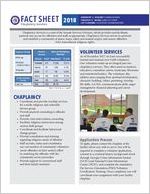FACT SHEET
Chaplaincy Services
2018
GREGORY C. DOZIER COMMISSIONER TIMOTHY C. WARD CHIEF OF STAFF JAY SANDERS ASSISTANT COMMISSIONER
Chaplaincy Services is a unit of the Inmate Services Division, which provides and facilitates pastoral care access for offenders and staff, as appropriate. Chaplaincy Services strives to promote
and establish a community of peace, hope, safety and mutual respect and ensure offenders First Amendment religious rights.
CHAPLAINCY
Coordinate and provide worship services for a multi-religious and culturally diverse group
Provide pastoral counseling to offender and staff
Provide crisis intervention counseling Facilitate religious instruction among
various faith groups Coordinate and facilitate behavioral
change groups Provide consultation and training
regarding religious needs of offender Staff recruits, trains and coordinates
our vast number of community volunteers Assist offenders in their reentry effort
by matching the offender with the community service providers Provide support to correctional staff and their family members
VOLUNTEER SERVICES
As of December 2017, we have successfully trained and retained over 9,200 volunteers. Our volunteers make up an integral part our chaplaincy services. They often assist as mentors, educators, counselors, tutors, musicians, librarians and ministerial leaders. The volunteers also address areas ranging from spiritual development, character building, values, parenting, worship, life skills, AA/NA, communications skills, anger management, financial planning and career development.
Application Process
To apply, please contact the chaplain at the facility where you wish to serve. You will be required to complete a volunteer application, consent to a criminal history background check through Georgia Crime Information System (GCIC) and National Crime Information Center (NCIC), and complete the mandatory Pre-Service Orientation (PSO)/Volunteer Certification Training. Once completed, you will coordinate your assignment with your facility chaplain.
FACT SHEET
Chaplaincy Services
2018
GREGORY C. DOZIER COMMISSIONER TIMOTHY C. WARD CHIEF OF STAFF JAY SANDERS ASSISTANT COMMISSIONER
NEW ORLEANS BAPTIST THEOLOGICAL
SEMINARY (NOBTS)
Established in 1995 at the Louisiana State Penitentiary Angola Extension Center, the program provides offenders the opportunity to obtain a Bachelor of Arts (B.A.) degree in Christian Ministry.
Phillips Extension Center
This center was established in 2006 as a part of the North Georgia Hub of NOBTS. The facility began its first class in March 2008. In December 2009, the students were awarded associate's degrees in Christian Ministry and in December 2010, 25 students graduated with a Bachelor of Arts degree in Christian Ministry. In total, 50 students have graduated the program since its inception. Graduates of the program have been assigned to 12 prisons throughout the GDC system to assist and participate in Chaplaincy, Faith and Character and Re-entry-Based opportunities within the offender population.
Program Structure
NOBTS is offered in four-year cycles to 30 offenders per class. The classes are taught and graded on a college level; therefore, failure to maintain a C average will result in academic probation and eventual expulsion from the program.
There are four classes: Marriage & Family Counseling; Introduction to Preaching; Church History and Evangelism. The program also consists of eight core competencies: Biblical Exposition, Christian Heritage, Servant Leadership, Interpersonal Relationships, Spiritual & Character Formation, Disciple Making, Life Skills and Worship Leadership.
Program Information
To participate in the program, offenders must have a high school diploma or GED, a minimum of five years left to serve upon completion of the program, be disciplinary free for 12 months, have staff recommendation, and be willing to participate.
Program Requirements
All NOBTS coursework is provided through Leavell College. Students must complete 126 hours of academic study, attend eight semesters/two per year and attend classes or study for eight hours a day. Tutor Programs are also available for advanced students to assist offenders with academic support and assist instructors with grading.
